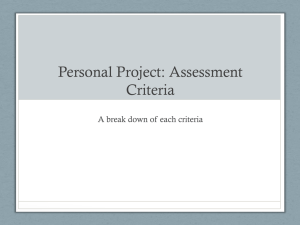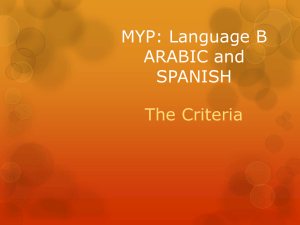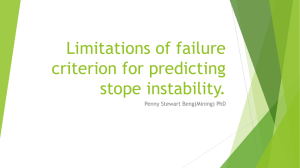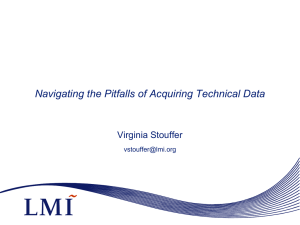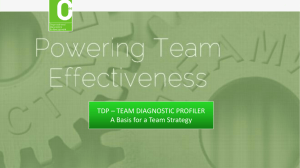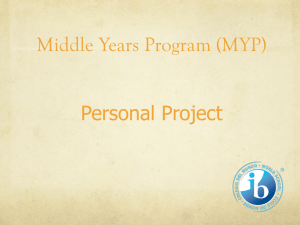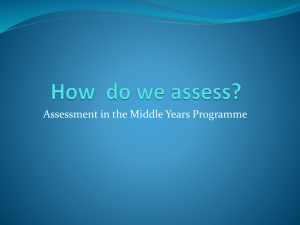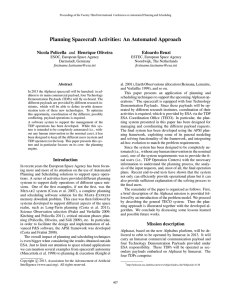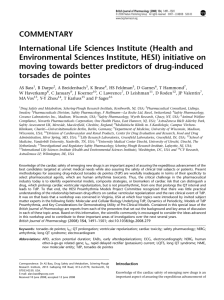TDP Pilot
advertisement
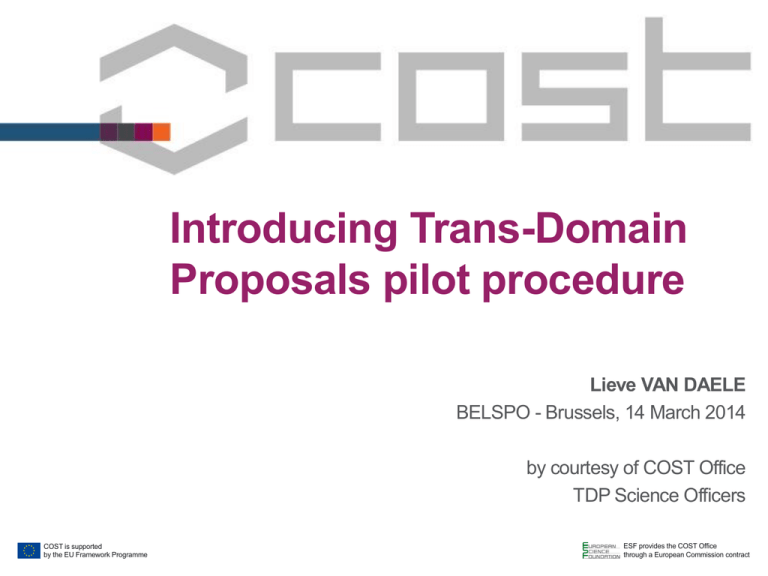
Introducing Trans-Domain Proposals pilot procedure Lieve VAN DAELE BELSPO - Brussels, 14 March 2014 by courtesy of COST Office TDP Science Officers COST is supported by the EU Framework Programme ESF provides the COST Office through a European Commission contract Motivations for a Pilot TDP Evaluation Procedure Need to better respond to the needs of growing transdisciplinary research communities Lighter and faster evaluation procedure so as to give quick answer to proposers Opportunity to allow COST to adapt and contribute to ERA goals Preparing integrated procedures for proposal evaluation, Action monitoring and impact assessment 2 TDP Pilot Key Features 1. Revised evaluation criteria and proposal template, enabling clearer description, evaluation and implementation of Action objectives, added value of networking, and COST activities through which such objectives will be pursued 2. Shortened evaluation process (time gain: ~1,5 months) replacing the current two-proposal scheme with a one-proposal scheme (10-15 pages) 3. Efficient expert selection and allocation through newly developed Expertise Grid and Expert Database 4. Clearer description of the process through detailed Guidelines for Proposers and Evaluators 3 TDP Pilot Proposal Template More concise proposal without loss of meaningful information, easier for both proposers and evaluators TDP Pilot Proposal Template A. Scientific and Technological Challenge B. Added Value of Networking C. Milestones and Deliverables – Contents and Timeframes D. Action Structure and Participation (Optional) References Total length: ~ 10 – 15 pages 4 New Challenges: Expert Identification Proposal Registration (Deadline 7 March 2014) Mandatory step not part of the evaluation itself, used for a timely selection of experts The Proposal is registered via e-COST to improve interaction and user-friendliness What is registered: Proposal Title, Acronym Initial idea: short abstract (up to 250 words) Areas of Expertise Needed for Evaluation: from a predefined multi-layered list of expertise areas 5 New Challenges: Expert Identification COST Experts Database – Newly Developed Used for a timely identification of relevant experts Algorithm matching areas of expertise required by the proposal and experts with relevant expertise Used in all steps of the evaluation procedure As of 15/02/2013: ~ 6000 registered experts (89% from COST Countries) All COST Countries represented Gender balance: 63% male, 37% female experts Early Stage Researchers (PhD+ 8 years): 25% Additional effort needed in covering all Research Areas 6 Proposal Evaluation 1st step “Challenge Selection”: External experts evaluate remotely the scientific and technological soundness and timeliness for which networking provides a clear added benefit to address the challenge 2nd step “Implementation Plan”: DC Members and DC Experts evaluate remotely the coherence and feasibility of the implementation plan supporting COST mission and criteria TDP Panel prepares consensus reports at a dedicated meeting TDP Panel Hearings: TDP Panel and DC Chairs evaluate leadership potential, motivation and drive, organisational and communication skills of the invited proposers 7 Proposal Evaluation Criteria Type Section A Criterion 1 Criterion 2 Criterion 3 Section A Criterion 4 Criterion 5 Criterion 6 Section B Criterion 7 Criterion 8 Section C Criterion 9 Criterion 10 Criterion 11 Criterion 12 Section D Criterion 13 Criterion 14 ID A.1 A.1.1 A.1.2 A.1.3 A.2 A.2.1 A.2.2 A.2.3 B B.1 B.2 C C.1 C.2 C.3 C.4 D D.1 D.2 Title Features of the Challenge State of the Art Relevance and Timeliness Challenge Feasibility Type of Impact Risk Level Scientific versus Societal Impact Timeframe Added Value of Networking In Relation to the Challenge In Relation to Existing Efforts Suitability for COST Anonymity Scope for COST Actions Action Structure Suitability Feasibility of Activities Foreseen Participation Network of Proposers Plans to Involve Relevant Participants COST enables break-through scientific developments leading to new concepts and products and thereby contributes to strengthen Europe’s research and innovation capacities. COST is a unique means for European researchers to jointly develop their own ideas and new initiatives across all scientific disciplines through trans-European networking of nationally funded research activities. 8 TDP Pilot - timeline Submissions to Trans-Domain Proposals March 7th closing of registrations MONTH 1 April 11th Collection MONTH 2 MONTH 3 JAF MONTH 4 MONTH Preparation of Proposal 5 MONTH 6 MONTH Approval CSO 7 MONTH 8 Preparation of MoU TDP Panel Hearings (final list) Step 1 - Challenge selection: External experts evaluation Step 2 - Implementation Plan: TDP Panel 9 New e-COST Tools: Proposal Registration (Deadline 07/03) 10 New e-COST Tools: Proposal Submission (Collection Date: 11.04) 11 New e-COST Tools: Network of Proposers Invitation tool allows proposers to interact and COST to monitor the growth of the network of proposers Proposer 1 University of Berne Dr. Proposer 1 (University of Berne) At least 5 Proposers (1 Main Proposer, 4 Secondary Proposers) affiliated with legal entities based in at least 5 different COST Member Countries or Cooperating State 12 New e-COST Tools: Evaluation 13 Practicalities • Proposal Registration Deadline: March 7th at 5pm Mandatory – registration • Proposal Submission Deadline: April 11th at 5pm • COST Experts database Always Open: Disseminate the opportunity to researchers in your country 14 For Further Information TDP page http://www.cost.eu/domains_actions/TDP Open Call Guidelines for TDP Pilot http://www.cost.eu/download/TDPguidelines e-COST (creation of user profile, proposal registration and submission) https://e-services.cost.eu COST Experts page http://www.cost.eu/participate/experts 15 For Further Information TDP Science Officers Are available to support researchers in your country with any question regarding the TDP Pilot: • Dr Giuseppe Lugano Tel. +32 (0) 2 533 3822 giuseppe.lugano@cost.eu • Dr Mafalda Quintas Tel. +32 (0) 2 533 3834 mafalda.quintas@cost.eu 16
